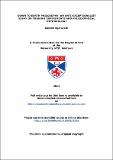Files in this item
Down to earth philosophy: an anti-exceptionalist essay on thought experiments and philosophical methodology
Item metadata
| dc.contributor.advisor | Brown, Jessica (Jessica Anne) | |
| dc.contributor.author | Sgaravatti, Daniele | |
| dc.coverage.spatial | 158 | en_US |
| dc.date.accessioned | 2012-10-25T14:11:46Z | |
| dc.date.available | 2012-10-25T14:11:46Z | |
| dc.date.issued | 2012-11-30 | |
| dc.identifier.uri | https://hdl.handle.net/10023/3228 | |
| dc.description.abstract | In the first part of the dissertation, chapters 1 to 3, I criticize several views which tend to set philosophy apart from other cognitive achievements. I argue against the popular views that 1) Intuitions, as a sui generis mental state, are involved crucially in philosophical methodology 2) Philosophy requires engagement in conceptual analysis, understood as the activity of considering thought experiments with the aim to throw light on the nature of our concepts, and 3) Much philosophical knowledge is a priori. I do not claim to have a proof that nothing in the vicinity of these views is correct; such a proof might well be impossible to give. However, I consider several versions, usually prominent ones, of each of the views, and I show those versions to be defective. Quite often, moreover, different versions of the same worry apply to different versions of the same theory. In the fourth chapter I discuss the epistemology of the judgements involved in philosophical thought experiments, arguing that their justification depends on their being the product of a competence in applying the concepts involved, a competence which goes beyond the possession of the concepts. I then offer, drawing from empirical psychology, a sketch of the form this cognitive competence could take. The overall picture squares well with the conclusions of the first part. In the last chapter I consider a challenge to the use of thought experiments in contemporary analytic philosophy coming from the ‘experimental philosophy’ movement. I argue that there is no way of individuating the class of hypothetical judgements under discussion which makes the challenge both interesting and sound. Moreover, I argue that there are reasons to think that philosophers possess some sort of expertise which sets them apart from non-philosophers in relevant ways. | en_US |
| dc.language.iso | en | en_US |
| dc.publisher | University of St Andrews | |
| dc.subject.lcc | BD241.S4 | |
| dc.subject.lcsh | Methodology | en_US |
| dc.subject.lcsh | Thought experiments | en_US |
| dc.subject.lcsh | Language and languages--Philosophy | en_US |
| dc.subject.lcsh | Philosophy of mind | en_US |
| dc.subject.lcsh | Knowledge, Theory of | en_US |
| dc.title | Down to earth philosophy: an anti-exceptionalist essay on thought experiments and philosophical methodology | en_US |
| dc.type | Thesis | en_US |
| dc.type.qualificationlevel | Doctoral | en_US |
| dc.type.qualificationname | PhD Doctor of Philosophy | en_US |
| dc.publisher.institution | The University of St Andrews | en_US |
This item appears in the following Collection(s)
Items in the St Andrews Research Repository are protected by copyright, with all rights reserved, unless otherwise indicated.

